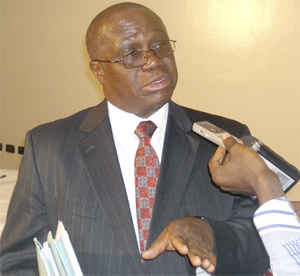- Home - News
- TWI News | TV
- Polls
- Year In Review
- News Archive
- Crime & Punishment
- Politics
- Regional
- Editorial
- Health
- Ghanaians Abroad
- Tabloid
- Africa
- Religion
- Election 2020
- Coronavirus
- News Videos | TV
- Photo Archives
- News Headlines
- Press Release
Business News of Friday, 7 February 2014
Source: B&FT
Cedi, inflation threat: Gov’t must do its part – BoG
New and extraordinary measures taken to stabilise the cedi and rein-in rising inflation must be “reinforced” by government through tighter fiscal policies and accelerated efforts to broaden the country’s export base, said the Bank of Ghana (BoG) on Thursday.
Speaking in Accra after an emergency meeting of the bank’s Monetary Policy Committee (MPC) to consider a swift response to the falling cedi and mounting inflation expectations, Governor Henry Kofi Wampah said government must do more to assist the monetary authorities correct the “weak fundamentals” driving price and exchange rate instability.
The MPC, he said, increased the policy rate from 16 percent to 18 percent -- the highest in four years -- to complement earlier steps, including new controls on foreign exchange transactions that the bank has taken to address emerging economic risks.
“[But] all these must be reinforced by ensuring that all the budgetary targets are strictly adhered to for fiscal consolidation,” Dr. Wampah said, adding: “the committee acknowledges the ongoing reforms to improve revenue mobilisation while containing expenditures. However, a lot more is required in rationalising the wage bill.”
Fiscal consolidation in 2013 was slow, he stated, with the projected budget deficit of 10.2 percent of GDP exceeding initial expectations of 9 percent. Finance Minister Seth Terkper has forecast a gap of 8.5 percent this year, but the Governor cautioned that unless government sticks to its fiscal programme, inflation -- which the BoG has targetted to stay within 7.5-11.5 percent by year-end -- could be higher at around 12 percent.
Pressure on the cedi is also due to Ghana’s high import profile, the Governor said, agreeing with calls to change the structure of the economy.
“In the medium- to long-term, government must seek to broaden the tax base further, diversify and broaden the export base, reduce imports -- especially of consumption goods that have local substitutes -- and intensify efforts to block foreign exchange leakages such as transfer pricing.”
On Wednesday, the central bank announced new restrictions on the currency market in a bid to boost the cedi, which fell by 7.8 percent against the dollar in January. The measures outlawed foreign exchange loans by domestic banks to customers who do not earn their income in foreign currency, and said offshore currency dealings by resident companies are “strictly prohibited”.
The BoG also directed that export earnings be repatriated by exporters to their banks within 60 days of shipment, and furthered instructed banks to convert the funds to cedis within five working days. It added that banks can buy exporters’ dollars at no more than the average interbank foreign exchange rate plus 200 basis points.
Dr. Wampah defended the rules, saying they will promote transparency, streamline the market, limit leakage of foreign currency and address money-laundering concerns. More importantly, he said, the central bank wants to stress the cedi’s status as the sole legal tender.
In the past year the currency has lost more than a fifth of its value against the dollar, pushing up the price of almost everything: fuel at the pumps, cooking gas, frozen chicken, clothing, furniture, footwear and the wigs that women use for their hair.
Two years ago, when the cedi weakened by 17.5 percent, the government shielded consumers from much of the impact by subsidising petrol, electricity and water -- a decision that contributed to a record budget deficit worth 12 percent of GDP.
This year, however, subsidies have been cancelled, leaving consumers to bear the brunt of the currency’s misfortune. From 8.8 percent in December 2012, inflation picked up to 13.5 percent in December 2013 and the persistently weak cedi threatens to force it higher.
Petroleum products have become especially expensive given their double exposure to the vagaries of the international price of crude oil and the local currency’s exchange rate. Petrol and diesel prices are up 41 percent and 45 percent respectively from a year ago, while liquefied petroleum gas (LPG) and kerosene have jumped by 112 percent and 169 percent in the same period.
The Bank of Ghana has traditionally aimed to keep inflation below 10 percent, but the removal of subsidies coupled with the impact of currency depreciation limits the bank’s ability to keep inflation within its comfort zone











